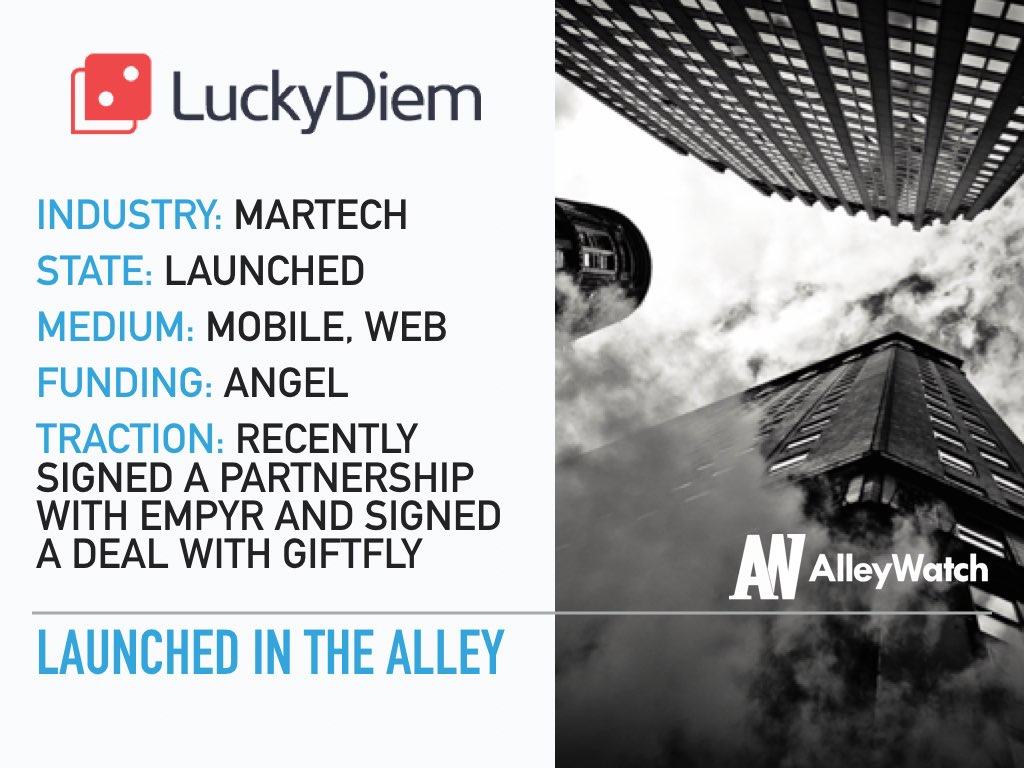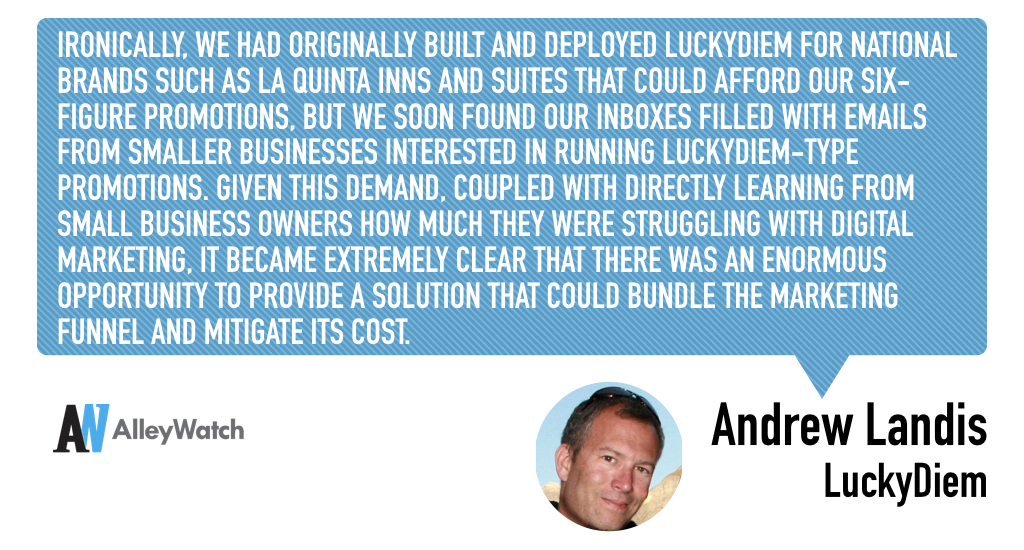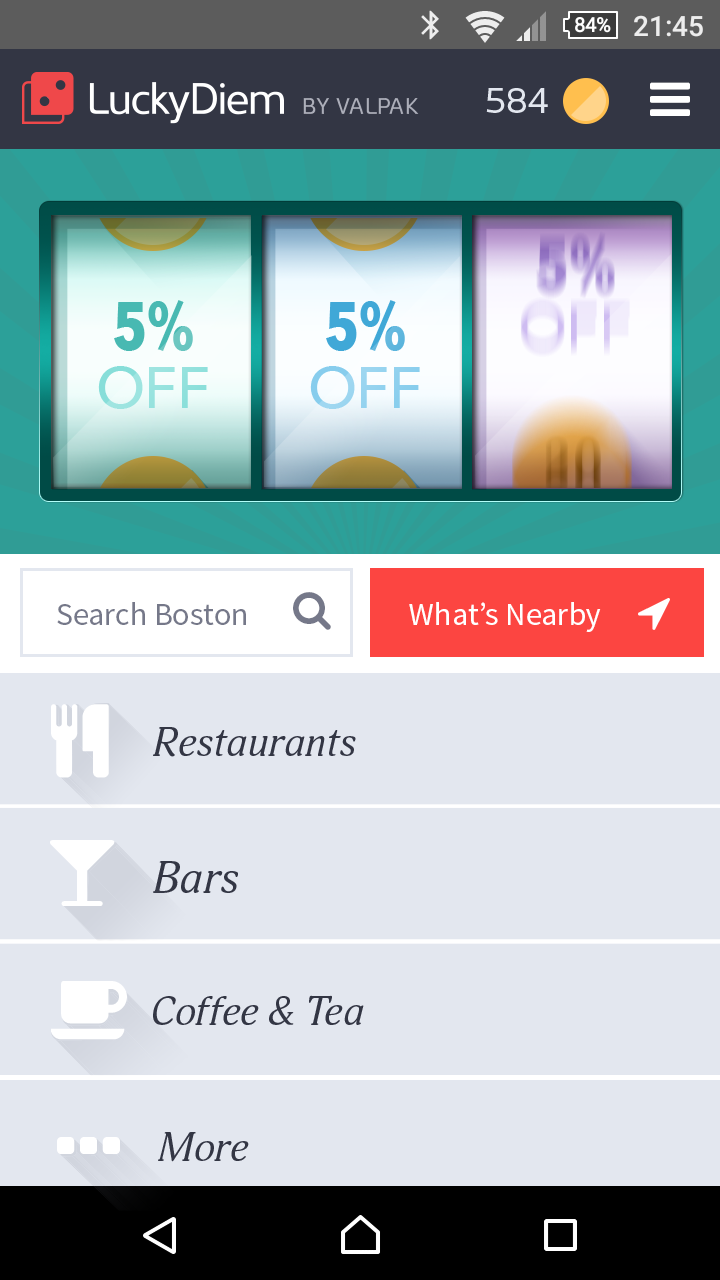Marketing companies will get into the nitty-gritty details about why they have the best product, but if at the end of the day they aren’t engaging in a meaningful way they are wasting time. With all of the competition that exists in grabbing attention, your only option is to be the most interesting or useful ad on the page. LuckyDiem is a mobile marketing platform that’s utilizing gaming and behavioral sciences to drive marketing home when it comes to local searches. Already partnering with Empyr and GiftFly, LuckyDiem is changing the accepted approach and showing just how engaging a marketing platform can be.
AlleyWatch chatted with CEO and founder Andrew Landis about the startup and how they plan to grow.
Tell us about the product or service.
LuckyDiem is a local search app that bundles the digital marketing funnel for businesses and integrates discounts, rewards and loyalty for consumers. We are attempting to level the playing field for small businesses to compete with national brands by removing time and money from the digital marketing equation.
How is it different?
There are three things that make LuckyDiem unique:
1. Turnkey Solution – The MarTech ecosystem in which we compete is very crowded, with nearly 5,000 service providers that include Google, PayPal, Square, Yelp and Groupon. While the size and breadth of some of our competitors is formidable, it also presents our greatest opportunity. SMBs are overwhelmed by the sheer number of digital marketing service providers available to them. They simply do not have the time or money, to learn, deploy and operate multiple systems. They want an integrated solution, and with more than two-thirds of local business owners not using an outside marketing service provider, digital marketing represents an enormous non-consumption market.
2. Online to Offline (O2O) Attribution – The single greatest challenge marketers of all sizes face is accurately connecting online marketing spend to the offline revenue it generates. LuckyDiem enables businesses to run multiple online promotions and only pay a commission on the consumer’s completed purchase—without any additional hardware, software or training—even for retail.
3. Endowment Effect – Consumers love their discounts. They are essentially hardwired into our DNA. The introduction of daily deals was literally like injecting steroids into the consumer’s neural pathway. Receiving a discount releases a bit of dopamine into our brain and can become habit forming. Removing them suddenly can have adverse reactions. JC Penny’s decision to remove discounting a few years ago, for example, proved disastrous with sales dropping an astounding 20% in the first quarter after its new pricing. The new JCP had taken, as some shoppers said, the “sense of achievement” out of the shopping process. Shoppers no longer felt excited and missed that hit of dopamine at checkout–even though they very well may have understood that the new “fair and square” price was even lower than what they may have received through discounting. This phenomenon of how rational people routinely and predictably, make irrational decisions, falls under an area of study called behavioral economics and includes something called the endowment effect that examines how we overvalue the things we own regardless of their objective market value. LuckyDiem has successfully developed and implemented a process in which the endowment effect is integrated into every promotion, efficiently and effectively changing the perceived value of discounts earned by consumers.
What market are you attacking and how big is it?
With almost half of all consumer spending at retail, or $2 trillion, influenced by mobile marketing, its impact upon the 26 million small businesses is overbearing. In fact, for the first time in U.S. history, small business in America is in decline. Small business simply can’t complete with the sophisticated marketing resources of corporate America. Google has done more harm than good in this respect with 70% of consumers finding a new business through search (and 80% of mobile searches ending in purchase), yet only 6% of small businesses use paid search.
What is the business model?
We take a 10% commission on every purchase. There are no other fees for the consumer or business.
What inspired the business?
Ironically, we had originally built and deployed LuckyDiem for national brands such as La Quinta Inns and Suites that could afford our six-figure promotions, but we soon found our inboxes filled with emails from smaller businesses interested in running LuckyDiem-type promotions. Given this demand, coupled with directly learning from small business owners how much they were struggling with digital marketing, it became extremely clear that there was an enormous opportunity to provide a solution that could bundle the marketing funnel and mitigate its cost.
What are the milestones that you plan to achieve within six months?
We are looking to launch our iOS app and release a major UI/UX update to our MVP web-app in July.
What is the one piece of startup advice that you never got?
Resist the overwhelming desire to think about your business in the middle of the night. Your mind and body need to rest and recharge. Pick up a Kindle instead of your phone or laptop, and read a book that has nothing to do with business.
If you could be put in touch with anyone in the New York community who would it be and why?
Any talented engineers in the NYC area with game theory experience.
Why did you launch in New York?
You would think being a fourth-generation New Yorker it might be time to get out of the city, but there’s no better place to launch a MarTech company that is focused on helping small businesses than right here. The rapid redevelopment of our neighborhoods offers each of us an up-close and personal view of how small business owners increasingly struggle to compete with national competitors.
Where is your favorite bar in the city for an after work drink?
Upstairs at the Kimberly Hotel. Upbeat roof-deck in the heart of midtown.






